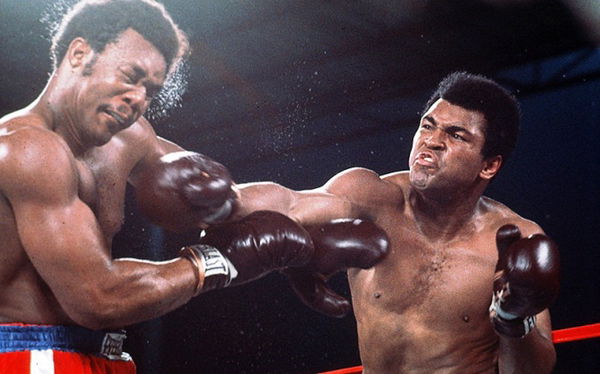

“My opponents don’t worry about losing, they worry about getting hurt,” a young 25-year-old George Foreman bragged before entering the ring with the legend, the myth, and for some, the god of boxing, Muhammad Ali. Evidently so. Before the upset that defined 20th-century boxing, Ali had lost to Joe Frazer, and then he lost to Ken Norton. However, by this time, there was a new cop in the heavyweight town, ‘Big George’ Foreman.
His record stood at 40 wins, no losses, and 37 knockouts. To top it off, his eight last fights ended just as quickly as they began, which included both Frazer and Norton. This should give you a pretty picture of what Ali did during the pre-dawn hours of 30 October 1974 at the Kinshasa, Zaire was a thing of legends. Today, it’s the 50th Anniversary of ‘The Rumble in The Jungle,’ and Foreman himself joined Ali’s daughters to celebrate the historic day.
ADVERTISEMENT
Article continues below this ad
George Foreman reflects on the invention of ‘Rope-a-dope’
Turning to Instagram, Foreman—a legend in his own right who returned to boxing in his 40s to dominate the heavyweight division once again—showed no bitterness about his upset. Sharing an adorable picture of himself eating a slice of cake, the 75-year-old wrote, “Can you believe 50 years ago, [in] the ‘Rumble in the Jungle,’ [I fought] Muhammad Ali? Looking back at the best time of my life—celebrate[ing] with me with a slice of cake, as I relive the ‘Rope-a-Dope.’”
Meanwhile, Ali’s daughter, Laila Ali, reacted to Foreman’s post: “❤.” She was later joined by her sister Hana Ali, who took to her Instagram story to celebrate the special day. “Today is the 50th Anniversary of the Rumble in the Jungle,” Hana wrote while sharing a 1995 interview featuring Foreman, where he spoke about becoming the victim of Ali’s famous ‘rope-a-dope.’
View this post on Instagram
In the 60-minute interview shared by Hana Ali that featured ‘Big George,’ Lesley Stahl asked whether Foreman respected the man in the opposite corner. Looking back, Foreman recalled, “I knew I respect[ed] him as being brave, the bravest man I’ve ever gotten into the ring with.” He explained when people would ask him whether Ali was the best boxer, he would say, “Nope,” adding, “He’s bigger than boxing. To put him in the best boxer would be too small for him. He was a hero.”
When asked why he lost the fight, Foreman claimed he fought a man who knew he could lose. Whereas Foreman never even thought that was a possibility. “I kept thinking, ‘I’m going to hit him with this punch anywhere [and] just going to knock him out.’ I kept hitting him boom, he was like, ‘I’m not going anywhere.’ I beat him up, I knock[ed] him against the ropes, [and] he said, ‘Fight me,’” Foreman recalled.
What’s your perspective on:
Does the 'Rumble in the Jungle' still stand as the greatest upset in boxing history?
Have an interesting take?
“Finally, he laid on the ropes and I like a dope, got tired. That’s the invention of the ‘Rope A Dope,’” stated George Foreman.
How Muhammad Ali Outsmarted Foreman?
Surrounded by 60,000 attendees, the fight became one of the most-watched televised events of all time. Despite his moniker ‘The Greatest of All Time,’ the 32-year-old stepped into the ring a 4–1 underdog. “For a few rounds, Ali might be able to escape Foreman’s sledgehammer strength, but not for 15 rounds,” Dave Anderson of the New York Times wrote. Boy, was Anderson wrong!
It was the classic tale of a technician vs. power puncher. Ali surprised Foreman with his unorthodox right-hand leads very early in the fight, although they didn’t cause any significant damage. It was in the second round when Ali adopted his famous rope-a-dope technique—leaning on the ropes with a high guard while allowing Foreman to punch his arms and body.
ADVERTISEMENT
Article continues below this ad

via Imago
(Original Caption) Muhammad Ali works out in gym here for forthcoming bout with George Forman.
This caused Foreman’s punches to either miss or deflect, as he kept losing stamina, and Ali kept conserving his. While all this was going on, Ali kept countering with straight punches to Foreman’s face and screaming at him, “That all you got, George?”, which further frustrated Foreman. Come the eighth round, it was showtime—Foreman was exhausted and Ali seized the moment.
The technician delivered a flurry of powerful combinations to Foreman’s head that floored ‘Big George.’ Foreman, ever the warrior, tried to rise and got on his knee, but Referee Zack Clayton called the fight. The stadium erupted in jubilant celebration as their chant of “Ali boma ye”, which translated to “Ali, kill him” had come to fruition.
ADVERTISEMENT
Article continues below this ad
When the fight ended, Ali was ahead in all three scorecards, 68–66, 70–67, and 69–66. Today, 50 years after the fight, Foreman took to Instagram today to commemorate the day he was outplayed and outsmarted by the man he felt was bigger than boxing itself.
50 years is a long time, but the fact that people still remember that night should tell you how pivotal the fight was for the sport, its fans, and the people involved in it. Muhammad Ali passed away in June 2016, but his work in and outside the ring will continue to live on. What did you think of ‘rope-a-dope’?
ADVERTISEMENT
ADVERTISEMENT
ADVERTISEMENT
ADVERTISEMENT


Does the 'Rumble in the Jungle' still stand as the greatest upset in boxing history?